unit 1 getting along with others-word power and grammar课件(牛津版模块5)
文档属性
| 名称 | unit 1 getting along with others-word power and grammar课件(牛津版模块5) |

|
|
| 格式 | rar | ||
| 文件大小 | 2.3MB | ||
| 资源类型 | 教案 | ||
| 版本资源 | 牛津译林版 | ||
| 科目 | 英语 | ||
| 更新时间 | 2011-10-17 00:00:00 | ||
图片预览

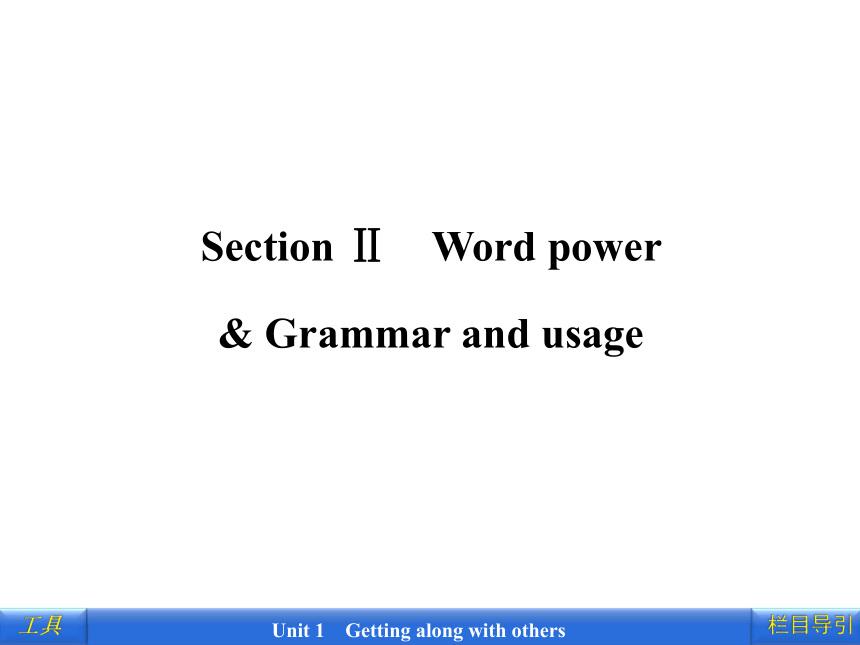

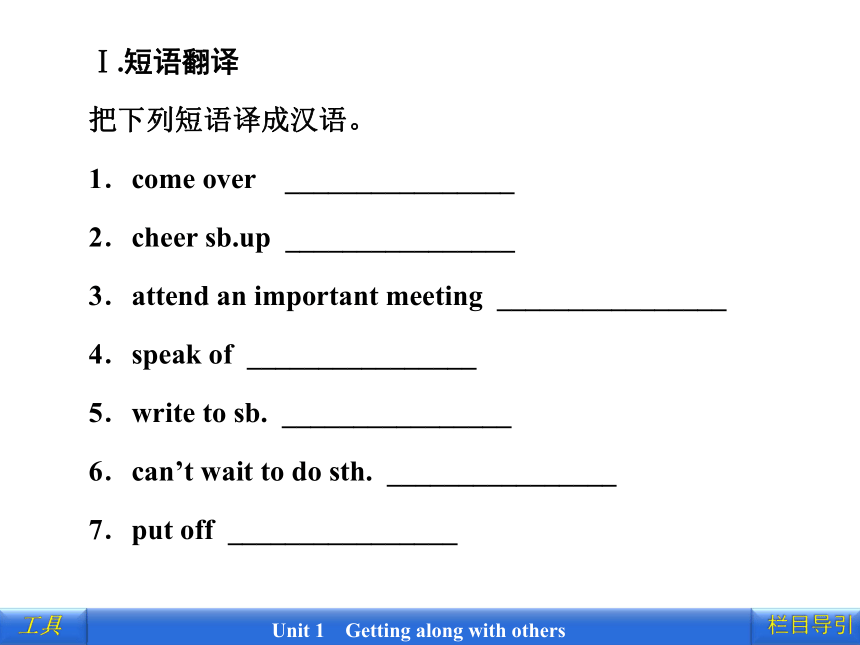
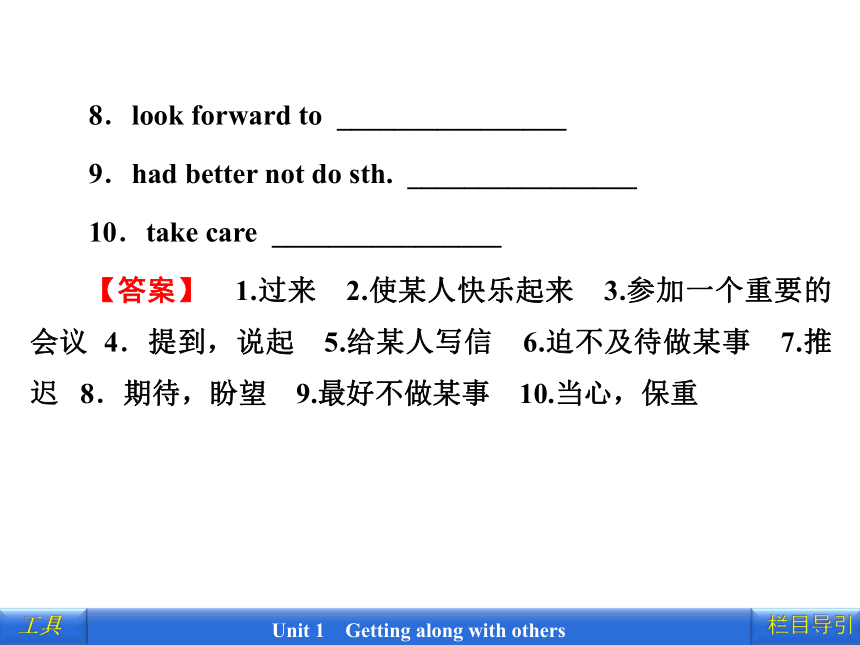
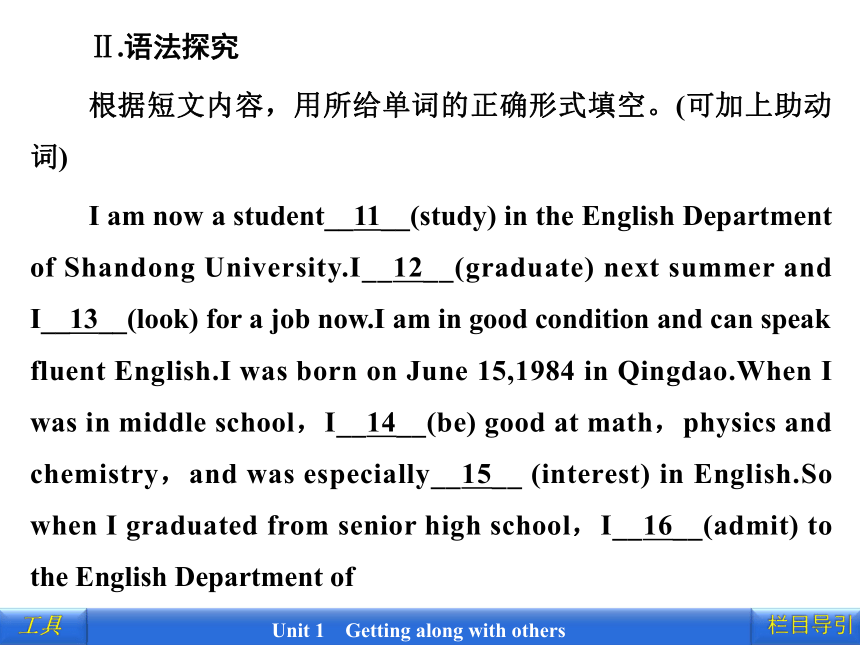
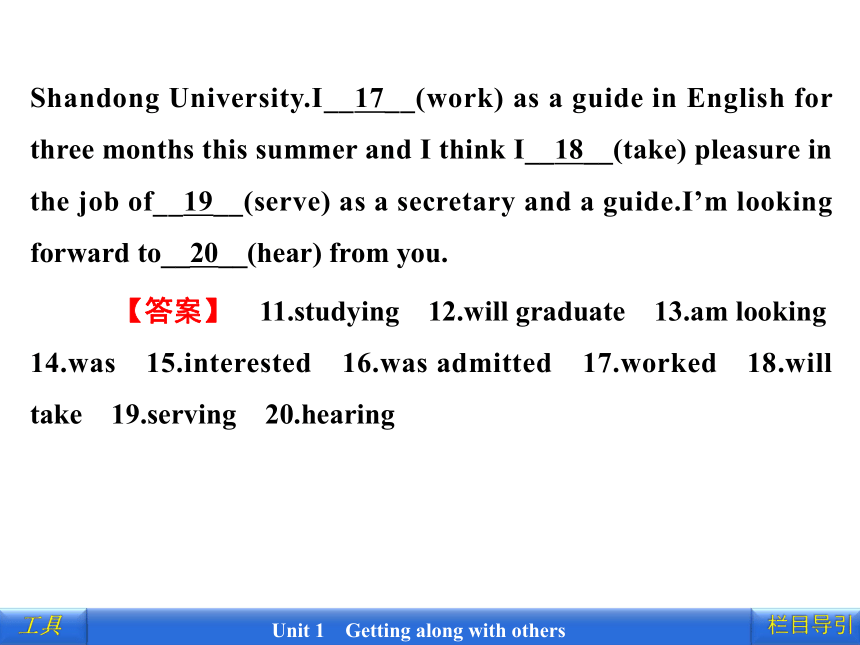
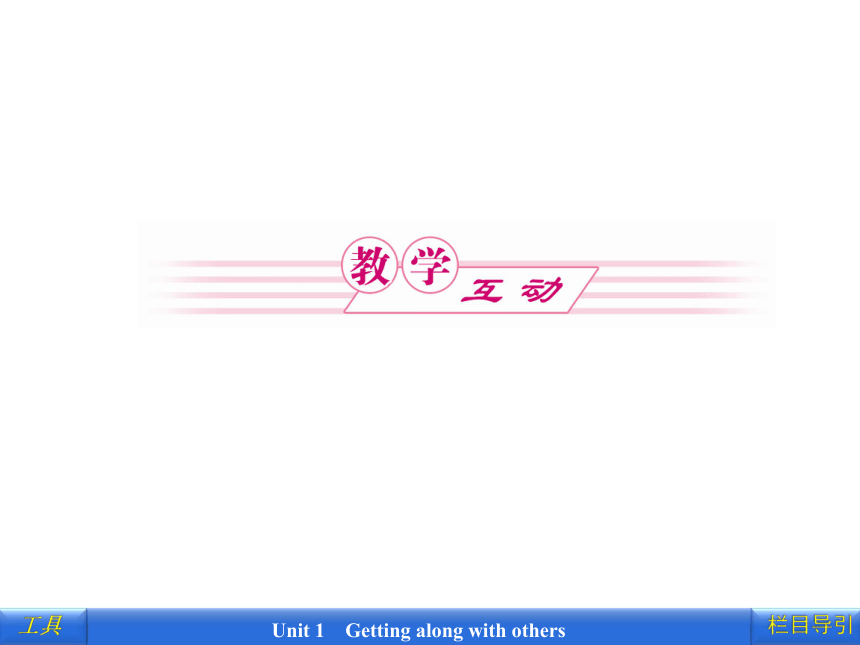
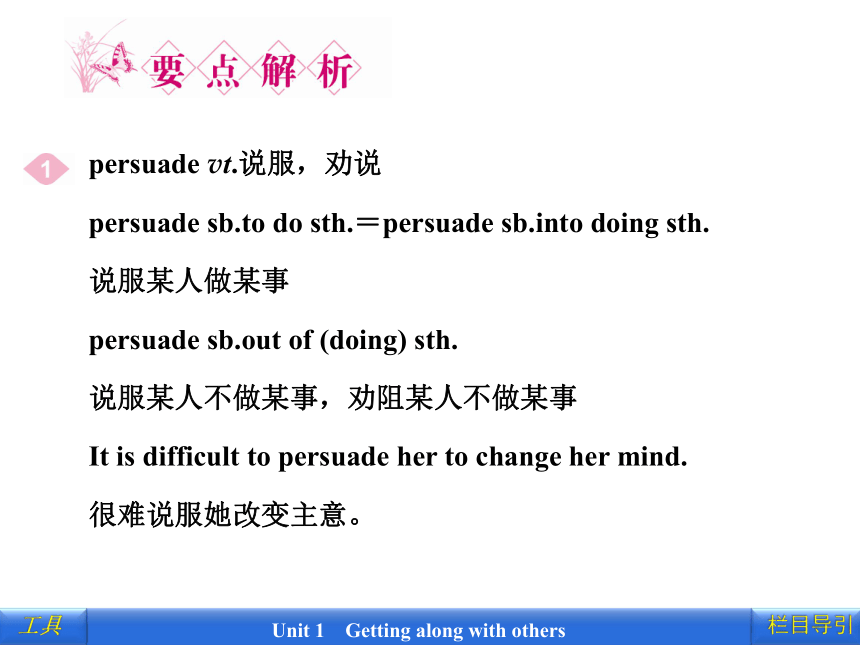
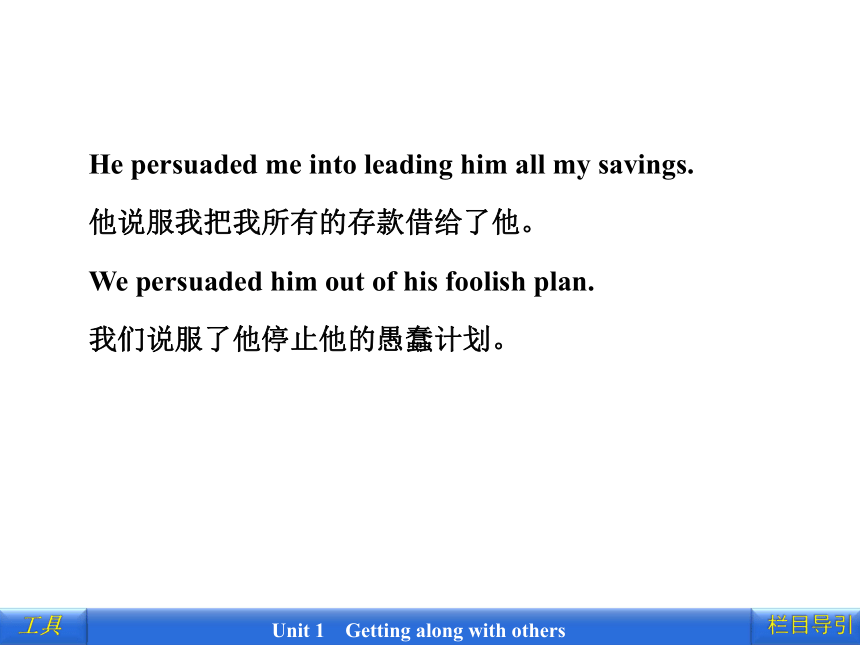
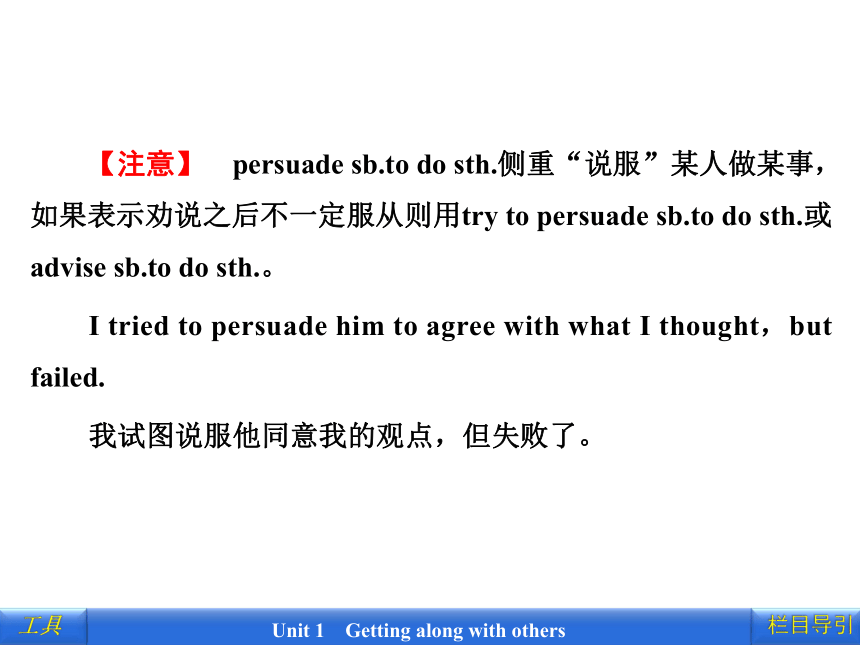

文档简介
(共96张PPT)
Section Ⅱ Word power
& Grammar and usage
Ⅰ.短语翻译
把下列短语译成汉语。
1.come over ________________
2.cheer sb.up ________________
3.attend an important meeting ________________
4.speak of ________________
5.write to sb. ________________
6.can’t wait to do sth. ________________
7.put off ________________
8.look forward to ________________
9.had better not do sth. ________________
10.take care ________________
【答案】 1.过来 2.使某人快乐起来 3.参加一个重要的会议 4.提到,说起 5.给某人写信 6.迫不及待做某事 7.推迟 8.期待,盼望 9.最好不做某事 10.当心,保重
Ⅱ.语法探究
根据短文内容,用所给单词的正确形式填空。(可加上助动词)
I am now a student__11__(study) in the English Department of Shandong University.I__12__(graduate) next summer and I__13__(look) for a job now.I am in good condition and can speak fluent English.I was born on June 15,1984 in Qingdao.When I was in middle school,I__14__(be) good at math,physics and chemistry,and was especially__15__ (interest) in English.So when I graduated from senior high school,I__16__(admit) to the English Department of
Shandong University.I__17__(work) as a guide in English for three months this summer and I think I__18__(take) pleasure in the job of__19__(serve) as a secretary and a guide.I’m looking forward to__20__(hear) from you.
【答案】 11.studying 12.will graduate 13.am looking 14.was 15.interested 16.was admitted 17.worked 18.will take 19.serving 20.hearing
persuade vt.说服,劝说
persuade sb.to do sth.=persuade sb.into doing sth.
说服某人做某事
persuade sb.out of (doing) sth.
说服某人不做某事,劝阻某人不做某事
It is difficult to persuade her to change her mind.
很难说服她改变主意。
He persuaded me into leading him all my savings.
他说服我把我所有的存款借给了他。
We persuaded him out of his foolish plan.
我们说服了他停止他的愚蠢计划。
【注意】 persuade sb.to do sth.侧重“说服”某人做某事,如果表示劝说之后不一定服从则用try to persuade sb.to do sth.或advise sb.to do sth.。
I tried to persuade him to agree with what I thought,but failed.
我试图说服他同意我的观点,但失败了。
persuade sb.of sth.说服某人相信某事
persuade sb.+that从句 使某人相信……
How did you persuade him of what you said
你是怎么让他相信你说的话的?
1.There is nothing more I can try______you to stay,so I wish you good luck.
A.being persuaded B.persuading
C.to be persuaded D.to persuade
【解析】 I can try________you to stay为定语从句,修饰nothing more;to persuade you to stay为不定式短语,表示目的。
【答案】 D
note n.笔记,记录,便条
take note/notice of...注意……
take a note/notes of...记录……,做……笔记
compare notes对笔记;交换意见
They developed the habit of making/taking notes in class.
他们养成了在课堂上做笔记的习惯。
2.We’re trying to ring you back,Bryan,but we think we ________your number incorrectly.
A.looked up B.took down
C.worked out D.brought about
【解析】 本题考查动词短语的意义辨析。A项意为“查阅”;B项意为“写下,记下”;C项意为“解出,算出”;D项意为“导致”。句意为:……,但我们认为我们把你的电话号码记错了。故B项正确。
【答案】 B
amusement n.娱乐,消遣(不可数);娱乐活动,消遣的事(可数)
in amusement好笑地
to one’s amusement令某人感到好笑的是
To our great amusement,the teacher sang a funny song during the class.
令我们感到非常好笑的是,老师在课堂上唱了一首滑稽的歌。
The hotel offers its guests a variety of amusements.
这家旅馆为客人提供各种娱乐项目。
amuse vt.逗笑;逗乐;使(人)愉快
amusing adj.逗人笑的;有趣的
amused adj.觉得好笑的
be amused at/by sth.觉得某事好笑
keep sb.amused使某人快乐;使某人消遣
We were all amused at his foolish behaviour.
我们对他那愚蠢的行为都感到好笑。
The children amused themselves by playing hide and seek games.孩子们玩捉迷藏游戏取乐。
3.We were________to see his face covered in thick cream.
A.amusing B.amused
C.amusement D.to amuse
【解析】 amused意为“觉得好笑的”,常用来修饰人;amusing有趣的,常用来修饰物。
【答案】 B
identity n.本身,本体;身份;相同,一致
There is no clue to the identity of the thief.
没有确定窃贼身份的线索。
identify v.确认,证明
identification n.认出,识别
identify...as...确认、证明……是……
identify oneself as自报身份,自称
identify...with...认为……等同于……
His only means of identification was his passport.
他唯一证明身份的证件就是他的护照。
4.The bodies were________as those of two suspected drug dealers.
A.regarded B.treated
C.considered D.identified
【解析】 四个选项均可以与介词as连用。但A、B、C三项意为“被看做……”,与句意不相符。be identified as...意为“被确认为……”。
【答案】 D
discourage v.使……丧失信心;劝阻(反义词:encourage)
discourage sb.(from doing sth.)
使某人泄气/劝阻某人(做某事)
Parents should discourage their children from smoking.
父母应该劝阻他们的孩子吸烟。
discouragement n.[U] 气馁;沮丧;[C] 令人气馁的事
discouraged adj.感到沮丧的;感到泄气的
discouraging adj.令人泄气的;令人沮丧的
encourage sb.to do sth.鼓励某人做某事
They encouraged the boy to work hard.
他们鼓励那男孩努力工作。
5.His parents tried to________him from being an actor.
A.encourage B.persuade
C.discourage D.advise
【解析】 discourage sb.from doing sth.劝阻某人做某事。
【答案】 C
tell jokes/tell a joke 讲笑话
He told a funny joke,making all laugh.
他讲了个有意思的笑话,把大家都逗笑了。
I like listening to my grandpa telling jokes after supper.
我喜欢晚饭后听爷爷讲故事。
regard...as a joke把……当做玩笑
play a joke on...开……的玩笑
play a trick on...开……的玩笑;捉弄……
make fun of...取笑……
make a fool of...愚弄……
laugh at 嘲笑
It’s impolite to make fun of others.
取笑他人是不礼貌的。
regard...as a joke把……当做玩笑
play a joke on...开……的玩笑
play a trick on...开……的玩笑;捉弄……
make fun of...取笑……
make a fool of...愚弄……
laugh at 嘲笑
It’s impolite to make fun of others.
取笑他人是不礼貌的。
6.I don’t like the joke you________on the old man.
A.made B.told
C.laughed D.played
【解析】 play a joke on sb.开某人的玩笑。本题对该短语进行了变式考查,即把名词提前,再把其余的成分变成定语从句。
【答案】 D
make it 成功做到;达到预定目标;及时抵达;约定时间
He says he’ll get up at 6 tomorrow morning,but he’ll never make it.他说明早要6点起床,但他是绝对做不到的。
The train goes at 10∶15.I think we shall make it.
火车10点一刻开。我想我们能赶上。
—Shall we meet next week
我们下周见面吗?
—Yes.Let’s make it next Sunday.
是的,我们约定在下个星期天见面吧。
表“成功”的短语还有take off、pay off等。
You might find this hard at first but it pays off when you come to speak.也许开始的时候你发觉这很难,但是当你不断地说英语的时候,你的口语就会越来越好。
7.—When shall we meet again
—Let’s________any day you like.It’s all the same to me.
A.make up B.make it
C.put up D.put it
【解析】 make up组成;编造;化妆;make it成功;约定时间;put up张贴,搭建。由句意可知应选B项。
【答案】 B
rather than 而不是
The parents rather than the children should be blamed.
应该责备家长而不是这些孩子。
He killed himself rather than got caught by the enemy.
他自杀了,而不是被敌人抓住了。
rather than与other than
(1)rather than 表示单纯的否定“而不是”时,可以连接词性相同的名词、代词、形容词、副词、动词的 ing/ ed形式以及介词短语等。
(2)other than=besides 除了……
I would walk rather than take a bus.
我宁愿步行也不坐公交车。
What other language do you speak other than French
除了说法语外你还说什么语言?
8.It was owing to luck________judgement________the driver succeeded in avoiding an accident.
A.better than;when B.rather than;that
C.other than;when D.more than;which
【解析】 本题考查词组的意思和强调结构。rather than而不是。
【答案】 B
take care of 照顾
be careful (of)当心,小心
look out (for)当心,小心
I took good care of him when he was ill.
他生病时我小心地照顾他。
9.________for snakes when crossing the tropical forest.
A.Take care B.Be careful
C.Look out D.Look through
【解析】 look out for sth.当心某事;小心某物。A、B两项不与for搭配;D项意思不对。
【答案】 C
Speaking of friends,I’ve met some nice people here in London and I think we might become close friends.说起朋友,我在伦敦这里遇到了些好人,我认为我们有可能成为好朋友。
speak of/about sb./sth.说起、谈到某人/某事
He didn’t speak of that incident at all at the meeting.
在会上他根本就未提及那件事。
Speaking of trip,I’d like to tell you about the experience I have.
说到旅行,我想告诉你我的经历。
speak to/with sb.与某人交谈
speaking of说起,谈到
generally speaking一般来说
personally speaking从个人角度来说
strictly speaking严格地说来
Generally speaking,people are more polite to those whom they think are of a higher social class.一般说来,人们对那些他们认为是上层社会的人更礼貌些。
10.Although he didn’t mention any names,everyone knew who he was________.
A.attending to B.turning to
C.speaking of D.talking to
【解析】 句意应为“……,人人都知道他谈论的是谁”。由此可知C项正确。speak of谈到,说起。
【答案】 C
Jane told me I had better spend more time studying,and I have been trying my best.简告诉我,要我最好将更多的时间用于学习,而且我已经在尽力了。
该句为复合句,and连接两个并列句。前一分句中含有told的宾语从句I had better...studying。
had better大致相当于一个情态动词,意为“最好,还是……的好”,后接动词原形。
用于否定句时,一般用“had better not+动词原形”形式。
You’d better not go now.你最好别现在走。
I’d better begin by introducing myself.
我最好首先自我介绍一下。
You’d better not spend your money like this.
你不应该这样乱花钱。
had better无人称、时态和数的变化,其中的had是虚拟语气形式,不是过去式,had better也不指过去,仅用于指现在和将来。
I’d better leave now,or I’ll be late.
我最好现在就走,否则就晚了。
Your cold seems quite a lot worse.I think you’d better stay at home today.
你的感冒似乎严重多了,我认为你今天最好待在家里。
11.完成句子
You’d better________(不要问些愚蠢的问题).(ask)
【答案】 not ask any silly questions
Why not write to me and tell me all about it
为什么不给我写信告诉我这一切呢?
and连接两个并列的谓语动词write和tell。
Why not do...?=Why don’t you do...
何不……,为什么不……?
Why don’t you have a try once again
=Why not have a try once again
为什么不再试一下呢?
Why don’t you call him right now?=Why not call him right now
为什么不立刻给他打个电话?
Why do you do...?=Why do...?为什么……?(表示责备)
Why do you make the same mistake again
=Why make the same mistake again
为什么又犯同样的错误呢?
Why do you talk to your mother like that
=Why talk to your mother like that?为什么那样跟你母亲讲话?
12.—How about putting some pictures into the report
—________A picture is worth a thousand words.
A.No way. B.Why not
C.All right D.No matter.
【解析】 由答语“A picture is worth a thousand words.”可知第二个人同意了第一个人的提议。A项为“没门儿”,表示拒绝;B项为“为什么不呢?”用于对对方的提议表示赞成;C项为“行吗?好吗?”表示提出疑问;D项表示“无论,不管”,与特殊疑问词连用,引导让步状语从句。
【答案】 B
一、动词不定式
不定式的句法功能
不定式在句子中可以作主语、表语、宾语、定语、补语和状语。作主语或宾语时,经常用it作形式主语或形式宾语;在feel,hear,listen to,look at,notice,observe,see,watch,have,let,make等使役动词或感官动词后面作宾补时,不定式不带to,但在被动语态中就必须带to。
It is right to give up smoking.
To see is to believe.
He wanted to go.
I often hear him sing the song.
He is often heard to sing the song.
【注意】 (1)不定式作定语如果是不及物动词或不定式所修饰的名词或代词是不定式动作的地点、工具等,不定式后面要有相应的介词。
There is nothing to worry about.
He is looking for a room to live in.
(2)不定式用主动语态或被动语态作定语在含义上有所不同。Have you anything to send
你有什么东西要寄吗?(to send的动作执行者是你)
Have you anything to be sent
你有什么要(我或别人)寄的东西吗?(to be sent的执行者是被省略的我或别人)
(3)不定式作状语可以表示目的、原因、结果或条件。其中作目的状语可以用in order to/so as to替代。作结果状语也可以用so...as to...,such...as to...,enough to...,only to...,too...to等结构来表示。
I came here to see you.(目的)
We were very happy to hear the news.(原因)
We hurried to the school to find nobody there.(结果)
To look at him,you would like him.(条件)
(4)某些形容词在“too...to...”结构中没有否定的含义而表示肯定,这类形容词有anxious,delighted,eager,easy,glad,kind,pleased,ready,surprised,willing等。另外,not,never,only,all,but等后面的“too...to”结构中,too的含义为“very”,不定式没有否定意义。
He was too surprised to see how angry his father was.
看到父亲那样生气,他非常吃惊。
It’s never too late to learn.活到老,学到老。
(5)不定式还经常用做独立成分,如to tell the truth(说实话),to be frank(坦率地说),to be exact(确切地说),to begin with(首先),to make a long story short(长话短说)等。
(6)不定式还经常与疑问词连用,在句中起名词的作用,作表语、主语、宾语等。
My question is when to go.
How to do with it is still unknown.
He didn’t know what to say.
不定式的时态
(1)不定式的一般形式所表示的动作通常与谓语动词的动作(状态)同时或几乎同时发生,或是在它之后发生。
I plan to attend the meeting to be held tomorrow.(表示将来)
(2)如果谓语表示的动作(情况)发生时,不定式表示的动作正在进行,这时不定式就要用进行时。
He is believed to be coming.=It is believed that he is coming.
(3)如果不定式的动作发生在谓语动词之前,就要用完成时。
I’m sorry to have kept you waiting so long.
(4)在seem,appear,think,consider,believe等表示看法与想法的动词后用不定式完成时,表示该动作先于另一个动作。
He seems to have seen the film.=It seems that he has seen the film.
不定式的语态
(1)不定式所修饰的名词或代词和不定式逻辑上构成主谓关系时,不定式往往用主动形式。
Have you got a key to unlock the door?(A key unlocks the door.)
(2)不定式和它前面被修饰的名词或代词构成逻辑上的动宾关系,又和该句主语构成逻辑上的主谓关系时,不定式常用主动形式。
He needs a room to live in.=He lives in a room.
(3)不定式作状语,并和句中主语构成逻辑上的动宾关系时,不定式多用主动形式。
The book is easy to understand.=The book is easy for someone to understand.=It is easy (for someone) to understand the book.
(4)there+be的结构中,当说话人考虑的是必须有人去完成某件事时,不定式用主动形式;如果说话人强调的是事情本身必须完成,则用被动形式。
There is nothing to be done.
意思可以为:某东西坏了,无法使之恢复正常。
There is nothing to do.
意思可以为:无事可做,感到十分无聊。
不带to的不定式
(1)在hear,listen to,feel,make,let,have,see,look at,watch,notice,observe等动词后面,不定式作宾补不用to。feel的宾补为to be时,to不能省。但是,上述结构改为被动语态时,不定式要加上to,但let后仍无to。
(2)在would rather,(would sooner,had rather,had sooner)...than,rather than等结构的than之后用不带to的不定式。
I would rather go than stay here.
(3)why(not)加不定式的句型中,不定式不带to。
Why not do it right now
(4)在can’t but,can’t choose but,can’t help but之后的不定式不带to表示“不得不”。
I can’t but admire his courage.
(5)动词不定式在介词but,except,besides后面对,如果这些介词之前若有行为动词do的各种形式,这些介词后面的不定式不带to,否则要带to。
I have no choice but to stay here.
She could do nothing but cry.
(6)为了避免重复,不定式可以省去to。
I’m really puzzled what to think or say.
不定式的复合结构
It is/was for/of sb.to do sth.构成了不定式的复合结构。其中表示人的性质和特征的形容词与of后面的名词或代词关系密切,有意义上的主谓关系;表示事物性质和特征的形容词for后面的名词或代词关系不密切,没有意义上的主谓关系,但与句中的不定式结构关系密切,有意义上的主谓关系。
It was very kind of you to come to help me.=You are very kind to come to help me.
这类形容词有brave,careful,careless,clever,bright,wise,foolish,silly,stupid,cruel,good,honest,kind,nice,right,rude,thoughtful,wrong等。
It is hard for him to get rid of his bad habits.=For him to get rid of his bad habits is hard.
这类形容词有easy,hard,difficult,important,necessary,impossible,convenient,possible,unnecessary等。
二、动名词
动名词的句法功能
(1)作主语
Learning a foreign language is very useful to me.
学习一门外语对我来说是非常有用的。
Seeing is believing.眼见为实。
动名词与不定式
动名词和不定式都可以作主语。动名词表示一般或抽象的多次性行为;不定式往往表示具体的或一次性的动作。
Taking care of the garden is my job.
料理这个花园是我的工作。(泛指工作)
To take care of the garden is my job today.
我今天的工作就是料理这个花园。(具体的一次性动作)
(2)作表语
此时主语和表语可以互换,动名词是用来说明前面主语的内容的。
My job is taking care of the garden.
我的工作就是料理这个花园。
(3)作宾语
①下列动词只能跟动名词作宾语:
consider,suggest/advise,look forward to,excuse/pardon
admit,delay/put off,fancy
avoid,miss,keep/keep on,practise
deny,finish,stop,appreciate
can’t help,mind,allow/permit,escape
【注意】 以下动词词组也要接动名词作宾语:
be used to (习惯于),lead to,devote to,object to,get down to,pay attention to,can’t stand (无法忍受),give up,feel like,insist on,thank you for,apologize for,be busy (in),have difficulty/trouble (in),have a good/wonderful/hard time (in) 等。
③动词like,love,prefer后接不定式和动名词均可。若表示经常性的行为可用动名词,若表示具体的行为常用不定式。如果love,like,prefer前有would/should,后面则接不定式。
I like swimming,but I don’t like to swim today.
我喜欢游泳,但我今天不想游泳。
I’d like to go to Qingdao this weekend.
这个周末我想去青岛。
④need,require,want作“需要”讲时,其后接动名词的主动形式或不定式的被动形式作宾语。这时,动名词的主动形式表示被动意义。
The car needs/wants/requires cleaning/to be cleaned.
汽车需要清洗了。
⑤在allow,advise,forbid,permit等动词后有以下结构:
allow/advise/forbid/permit
We don’t allow smoking here.
此处不准吸烟。
We don’t allow students to smoke here.
我们不允许学生在此处吸烟。
⑥在下列短语中的介词后常可接动名词作宾语:
look forward to,be used to,depend on,prevent...from,feel like,be fond of,succeed in,excuse...for,be proud of,give up,stick to,lead to,thanks to,devote oneself to,pay attention to,be busy in,apologize for等。
We all are looking forward to seeing you.
我们大家都盼望着见到你。
I’m glad that you succeeded in passing the exam.
我很高兴你能通过考试。
(4)作定语
常用来说明被修饰词的性质和用途。
a walking stick一根拐杖
a swimming pool一个游泳池
动名词的复合结构
动名词的复合结构由形容词性物主代词或人称代词的宾格、名词所有格或普通格加动名词构成。在句子开头必须用名词所有格或物主代词。如果名词是无生命的或表示抽象概念时,只能用名词普通格。
There is still some hope of Tom/Tom’s winning the championship.汤姆得冠军仍有希望。
Would you mind my/me smoking here
我在这儿吸烟你介意吗?
(√)Mary’s joining us will be of much help.
(?)Mary joining us will be of much help.
玛丽参加到我们当中将会有很大帮助。
(?)Him going won’t be of much help.
(√)His going won’t be of much help.
他去不会有很大帮助。
(?)There is little hope of their group’s winning the red banner.
(√)There is little hope of their group winning the red banner.
他们组得红旗的希望几乎为零。
Ⅰ.单项选择
从A、B、C、D四个选项中,选出可以填入空白处的最佳选项。
1.The patient was warned________oily food after the operation.
A.to eat not B.eating not
C.not to eat D.not eating
【解析】 be warned not to do sth.表示“被警告不要做某事”,其中not to do sth.作主语补足语。
【答案】 C
2.It is said in Australia there is more land than the government knows________.
A.it what to do with
B.what to do it with
C.what to do with it
D.to do what with it
【答案】 C
3.—What’s the matter with you
—________the window,my finger was cut unexpectedly.
A.Cleaning B.To clean
C.While cleaning D.While I was cleaning
【答案】 D
4.I don’t think________possible to master a foreign language without much memory work.
A.this B.that
C.its D.it
【答案】 D
5.Robert is said________aboard,but I don’t know what country he studied in.
A.to have studied B.to study
C.to be studying D.to have been studying
【解析】 从后一句“我不知道他曾在哪国学习”知道,不定式要表示的动作发生在谓语动作is said之前。
【答案】 A
6.“Goodbye,then,”she said,without even________ from her book.
A.looking down B.looking up
C.looking away D.looking on
【解析】 本题考查动词词组。look down向下看……;look up仰视;look on旁观,由句意可知B项正确;without even looking up from her book“甚至没有放下书抬眼看看”。
【答案】 B
7.—Robert is indeed a wise man.
—Oh,yes.How often I have regretted________his advice!
A.to take B.taking
C.not to take D.not taking
【解析】 regret doing sth.表示“为做了某事而后悔”,本题同时又表示否定,故选D。
【答案】 D
8.You can’t imagine what difficulty we had________home in the snowstorm.
A.walked B.walk
C.to walk D.walking
【解析】 have difficulty (in) doing sth.干……有困难。
【答案】 D
9.—Do you have any idea what Paul does all day
—As I know,he spends at least as much time playing as he________.
A.writes B.does writing
C.is writing D.does write
【解析】 spend time doing sth.“花费时间干某事”,does代替spends。
【答案】 B
10.Isn’t it time you got down to________the papers
A.mark B.be marked
C.being marked D.marking
【解析】 本题考查动词短语及非谓语动词的用法。get down to...“着手干……”。to为介词,因此后面应接名词或动名词。
【答案】 D
Ⅱ.选词填空
根据句意,选择合适的单词形式填空。
11.A.We forgot________(to bring/bringing) our tickets,but please let us enter,will you
B.I’ll never forget________(to see/seeing) my daughter dance in public for the first time.
【答案】 to bring;seeing
12.A.—Let me tell you something about the journalists.
—Don’t you remember________(to tell/telling) me the story yesterday
B.Try to remember________(turning/to turn) off the light when you leave the room.
【答案】 telling;to turn
13.A.We’re just trying________(to reach/reaching) a point where both sides will sit down together and talk.
B.Try________(to phone/phoning) his home number.He may be at home.
【答案】 to reach;phoning
14.A.—I just can’t stop________(to worry/worrying) about the result of the job interview.
—Relax.There’s nothing you can do now but wait.
B.She reached the top of the hill and stopped________ (resting/to rest) on a big rock by the side of the path.
【答案】 worrying;to rest
15.A.The owner of the cinema needed to make a lot of improvements and employ more people to keep it running,which meant________(to spend/spending) tens of thousands of pounds.
B.I meant________(to go/going) running this morning,but I overslept.
【答案】 spending;to go
练考题、验能力、轻巧夺冠
Section Ⅱ Word power
& Grammar and usage
Ⅰ.短语翻译
把下列短语译成汉语。
1.come over ________________
2.cheer sb.up ________________
3.attend an important meeting ________________
4.speak of ________________
5.write to sb. ________________
6.can’t wait to do sth. ________________
7.put off ________________
8.look forward to ________________
9.had better not do sth. ________________
10.take care ________________
【答案】 1.过来 2.使某人快乐起来 3.参加一个重要的会议 4.提到,说起 5.给某人写信 6.迫不及待做某事 7.推迟 8.期待,盼望 9.最好不做某事 10.当心,保重
Ⅱ.语法探究
根据短文内容,用所给单词的正确形式填空。(可加上助动词)
I am now a student__11__(study) in the English Department of Shandong University.I__12__(graduate) next summer and I__13__(look) for a job now.I am in good condition and can speak fluent English.I was born on June 15,1984 in Qingdao.When I was in middle school,I__14__(be) good at math,physics and chemistry,and was especially__15__ (interest) in English.So when I graduated from senior high school,I__16__(admit) to the English Department of
Shandong University.I__17__(work) as a guide in English for three months this summer and I think I__18__(take) pleasure in the job of__19__(serve) as a secretary and a guide.I’m looking forward to__20__(hear) from you.
【答案】 11.studying 12.will graduate 13.am looking 14.was 15.interested 16.was admitted 17.worked 18.will take 19.serving 20.hearing
persuade vt.说服,劝说
persuade sb.to do sth.=persuade sb.into doing sth.
说服某人做某事
persuade sb.out of (doing) sth.
说服某人不做某事,劝阻某人不做某事
It is difficult to persuade her to change her mind.
很难说服她改变主意。
He persuaded me into leading him all my savings.
他说服我把我所有的存款借给了他。
We persuaded him out of his foolish plan.
我们说服了他停止他的愚蠢计划。
【注意】 persuade sb.to do sth.侧重“说服”某人做某事,如果表示劝说之后不一定服从则用try to persuade sb.to do sth.或advise sb.to do sth.。
I tried to persuade him to agree with what I thought,but failed.
我试图说服他同意我的观点,但失败了。
persuade sb.of sth.说服某人相信某事
persuade sb.+that从句 使某人相信……
How did you persuade him of what you said
你是怎么让他相信你说的话的?
1.There is nothing more I can try______you to stay,so I wish you good luck.
A.being persuaded B.persuading
C.to be persuaded D.to persuade
【解析】 I can try________you to stay为定语从句,修饰nothing more;to persuade you to stay为不定式短语,表示目的。
【答案】 D
note n.笔记,记录,便条
take note/notice of...注意……
take a note/notes of...记录……,做……笔记
compare notes对笔记;交换意见
They developed the habit of making/taking notes in class.
他们养成了在课堂上做笔记的习惯。
2.We’re trying to ring you back,Bryan,but we think we ________your number incorrectly.
A.looked up B.took down
C.worked out D.brought about
【解析】 本题考查动词短语的意义辨析。A项意为“查阅”;B项意为“写下,记下”;C项意为“解出,算出”;D项意为“导致”。句意为:……,但我们认为我们把你的电话号码记错了。故B项正确。
【答案】 B
amusement n.娱乐,消遣(不可数);娱乐活动,消遣的事(可数)
in amusement好笑地
to one’s amusement令某人感到好笑的是
To our great amusement,the teacher sang a funny song during the class.
令我们感到非常好笑的是,老师在课堂上唱了一首滑稽的歌。
The hotel offers its guests a variety of amusements.
这家旅馆为客人提供各种娱乐项目。
amuse vt.逗笑;逗乐;使(人)愉快
amusing adj.逗人笑的;有趣的
amused adj.觉得好笑的
be amused at/by sth.觉得某事好笑
keep sb.amused使某人快乐;使某人消遣
We were all amused at his foolish behaviour.
我们对他那愚蠢的行为都感到好笑。
The children amused themselves by playing hide and seek games.孩子们玩捉迷藏游戏取乐。
3.We were________to see his face covered in thick cream.
A.amusing B.amused
C.amusement D.to amuse
【解析】 amused意为“觉得好笑的”,常用来修饰人;amusing有趣的,常用来修饰物。
【答案】 B
identity n.本身,本体;身份;相同,一致
There is no clue to the identity of the thief.
没有确定窃贼身份的线索。
identify v.确认,证明
identification n.认出,识别
identify...as...确认、证明……是……
identify oneself as自报身份,自称
identify...with...认为……等同于……
His only means of identification was his passport.
他唯一证明身份的证件就是他的护照。
4.The bodies were________as those of two suspected drug dealers.
A.regarded B.treated
C.considered D.identified
【解析】 四个选项均可以与介词as连用。但A、B、C三项意为“被看做……”,与句意不相符。be identified as...意为“被确认为……”。
【答案】 D
discourage v.使……丧失信心;劝阻(反义词:encourage)
discourage sb.(from doing sth.)
使某人泄气/劝阻某人(做某事)
Parents should discourage their children from smoking.
父母应该劝阻他们的孩子吸烟。
discouragement n.[U] 气馁;沮丧;[C] 令人气馁的事
discouraged adj.感到沮丧的;感到泄气的
discouraging adj.令人泄气的;令人沮丧的
encourage sb.to do sth.鼓励某人做某事
They encouraged the boy to work hard.
他们鼓励那男孩努力工作。
5.His parents tried to________him from being an actor.
A.encourage B.persuade
C.discourage D.advise
【解析】 discourage sb.from doing sth.劝阻某人做某事。
【答案】 C
tell jokes/tell a joke 讲笑话
He told a funny joke,making all laugh.
他讲了个有意思的笑话,把大家都逗笑了。
I like listening to my grandpa telling jokes after supper.
我喜欢晚饭后听爷爷讲故事。
regard...as a joke把……当做玩笑
play a joke on...开……的玩笑
play a trick on...开……的玩笑;捉弄……
make fun of...取笑……
make a fool of...愚弄……
laugh at 嘲笑
It’s impolite to make fun of others.
取笑他人是不礼貌的。
regard...as a joke把……当做玩笑
play a joke on...开……的玩笑
play a trick on...开……的玩笑;捉弄……
make fun of...取笑……
make a fool of...愚弄……
laugh at 嘲笑
It’s impolite to make fun of others.
取笑他人是不礼貌的。
6.I don’t like the joke you________on the old man.
A.made B.told
C.laughed D.played
【解析】 play a joke on sb.开某人的玩笑。本题对该短语进行了变式考查,即把名词提前,再把其余的成分变成定语从句。
【答案】 D
make it 成功做到;达到预定目标;及时抵达;约定时间
He says he’ll get up at 6 tomorrow morning,but he’ll never make it.他说明早要6点起床,但他是绝对做不到的。
The train goes at 10∶15.I think we shall make it.
火车10点一刻开。我想我们能赶上。
—Shall we meet next week
我们下周见面吗?
—Yes.Let’s make it next Sunday.
是的,我们约定在下个星期天见面吧。
表“成功”的短语还有take off、pay off等。
You might find this hard at first but it pays off when you come to speak.也许开始的时候你发觉这很难,但是当你不断地说英语的时候,你的口语就会越来越好。
7.—When shall we meet again
—Let’s________any day you like.It’s all the same to me.
A.make up B.make it
C.put up D.put it
【解析】 make up组成;编造;化妆;make it成功;约定时间;put up张贴,搭建。由句意可知应选B项。
【答案】 B
rather than 而不是
The parents rather than the children should be blamed.
应该责备家长而不是这些孩子。
He killed himself rather than got caught by the enemy.
他自杀了,而不是被敌人抓住了。
rather than与other than
(1)rather than 表示单纯的否定“而不是”时,可以连接词性相同的名词、代词、形容词、副词、动词的 ing/ ed形式以及介词短语等。
(2)other than=besides 除了……
I would walk rather than take a bus.
我宁愿步行也不坐公交车。
What other language do you speak other than French
除了说法语外你还说什么语言?
8.It was owing to luck________judgement________the driver succeeded in avoiding an accident.
A.better than;when B.rather than;that
C.other than;when D.more than;which
【解析】 本题考查词组的意思和强调结构。rather than而不是。
【答案】 B
take care of 照顾
be careful (of)当心,小心
look out (for)当心,小心
I took good care of him when he was ill.
他生病时我小心地照顾他。
9.________for snakes when crossing the tropical forest.
A.Take care B.Be careful
C.Look out D.Look through
【解析】 look out for sth.当心某事;小心某物。A、B两项不与for搭配;D项意思不对。
【答案】 C
Speaking of friends,I’ve met some nice people here in London and I think we might become close friends.说起朋友,我在伦敦这里遇到了些好人,我认为我们有可能成为好朋友。
speak of/about sb./sth.说起、谈到某人/某事
He didn’t speak of that incident at all at the meeting.
在会上他根本就未提及那件事。
Speaking of trip,I’d like to tell you about the experience I have.
说到旅行,我想告诉你我的经历。
speak to/with sb.与某人交谈
speaking of说起,谈到
generally speaking一般来说
personally speaking从个人角度来说
strictly speaking严格地说来
Generally speaking,people are more polite to those whom they think are of a higher social class.一般说来,人们对那些他们认为是上层社会的人更礼貌些。
10.Although he didn’t mention any names,everyone knew who he was________.
A.attending to B.turning to
C.speaking of D.talking to
【解析】 句意应为“……,人人都知道他谈论的是谁”。由此可知C项正确。speak of谈到,说起。
【答案】 C
Jane told me I had better spend more time studying,and I have been trying my best.简告诉我,要我最好将更多的时间用于学习,而且我已经在尽力了。
该句为复合句,and连接两个并列句。前一分句中含有told的宾语从句I had better...studying。
had better大致相当于一个情态动词,意为“最好,还是……的好”,后接动词原形。
用于否定句时,一般用“had better not+动词原形”形式。
You’d better not go now.你最好别现在走。
I’d better begin by introducing myself.
我最好首先自我介绍一下。
You’d better not spend your money like this.
你不应该这样乱花钱。
had better无人称、时态和数的变化,其中的had是虚拟语气形式,不是过去式,had better也不指过去,仅用于指现在和将来。
I’d better leave now,or I’ll be late.
我最好现在就走,否则就晚了。
Your cold seems quite a lot worse.I think you’d better stay at home today.
你的感冒似乎严重多了,我认为你今天最好待在家里。
11.完成句子
You’d better________(不要问些愚蠢的问题).(ask)
【答案】 not ask any silly questions
Why not write to me and tell me all about it
为什么不给我写信告诉我这一切呢?
and连接两个并列的谓语动词write和tell。
Why not do...?=Why don’t you do...
何不……,为什么不……?
Why don’t you have a try once again
=Why not have a try once again
为什么不再试一下呢?
Why don’t you call him right now?=Why not call him right now
为什么不立刻给他打个电话?
Why do you do...?=Why do...?为什么……?(表示责备)
Why do you make the same mistake again
=Why make the same mistake again
为什么又犯同样的错误呢?
Why do you talk to your mother like that
=Why talk to your mother like that?为什么那样跟你母亲讲话?
12.—How about putting some pictures into the report
—________A picture is worth a thousand words.
A.No way. B.Why not
C.All right D.No matter.
【解析】 由答语“A picture is worth a thousand words.”可知第二个人同意了第一个人的提议。A项为“没门儿”,表示拒绝;B项为“为什么不呢?”用于对对方的提议表示赞成;C项为“行吗?好吗?”表示提出疑问;D项表示“无论,不管”,与特殊疑问词连用,引导让步状语从句。
【答案】 B
一、动词不定式
不定式的句法功能
不定式在句子中可以作主语、表语、宾语、定语、补语和状语。作主语或宾语时,经常用it作形式主语或形式宾语;在feel,hear,listen to,look at,notice,observe,see,watch,have,let,make等使役动词或感官动词后面作宾补时,不定式不带to,但在被动语态中就必须带to。
It is right to give up smoking.
To see is to believe.
He wanted to go.
I often hear him sing the song.
He is often heard to sing the song.
【注意】 (1)不定式作定语如果是不及物动词或不定式所修饰的名词或代词是不定式动作的地点、工具等,不定式后面要有相应的介词。
There is nothing to worry about.
He is looking for a room to live in.
(2)不定式用主动语态或被动语态作定语在含义上有所不同。Have you anything to send
你有什么东西要寄吗?(to send的动作执行者是你)
Have you anything to be sent
你有什么要(我或别人)寄的东西吗?(to be sent的执行者是被省略的我或别人)
(3)不定式作状语可以表示目的、原因、结果或条件。其中作目的状语可以用in order to/so as to替代。作结果状语也可以用so...as to...,such...as to...,enough to...,only to...,too...to等结构来表示。
I came here to see you.(目的)
We were very happy to hear the news.(原因)
We hurried to the school to find nobody there.(结果)
To look at him,you would like him.(条件)
(4)某些形容词在“too...to...”结构中没有否定的含义而表示肯定,这类形容词有anxious,delighted,eager,easy,glad,kind,pleased,ready,surprised,willing等。另外,not,never,only,all,but等后面的“too...to”结构中,too的含义为“very”,不定式没有否定意义。
He was too surprised to see how angry his father was.
看到父亲那样生气,他非常吃惊。
It’s never too late to learn.活到老,学到老。
(5)不定式还经常用做独立成分,如to tell the truth(说实话),to be frank(坦率地说),to be exact(确切地说),to begin with(首先),to make a long story short(长话短说)等。
(6)不定式还经常与疑问词连用,在句中起名词的作用,作表语、主语、宾语等。
My question is when to go.
How to do with it is still unknown.
He didn’t know what to say.
不定式的时态
(1)不定式的一般形式所表示的动作通常与谓语动词的动作(状态)同时或几乎同时发生,或是在它之后发生。
I plan to attend the meeting to be held tomorrow.(表示将来)
(2)如果谓语表示的动作(情况)发生时,不定式表示的动作正在进行,这时不定式就要用进行时。
He is believed to be coming.=It is believed that he is coming.
(3)如果不定式的动作发生在谓语动词之前,就要用完成时。
I’m sorry to have kept you waiting so long.
(4)在seem,appear,think,consider,believe等表示看法与想法的动词后用不定式完成时,表示该动作先于另一个动作。
He seems to have seen the film.=It seems that he has seen the film.
不定式的语态
(1)不定式所修饰的名词或代词和不定式逻辑上构成主谓关系时,不定式往往用主动形式。
Have you got a key to unlock the door?(A key unlocks the door.)
(2)不定式和它前面被修饰的名词或代词构成逻辑上的动宾关系,又和该句主语构成逻辑上的主谓关系时,不定式常用主动形式。
He needs a room to live in.=He lives in a room.
(3)不定式作状语,并和句中主语构成逻辑上的动宾关系时,不定式多用主动形式。
The book is easy to understand.=The book is easy for someone to understand.=It is easy (for someone) to understand the book.
(4)there+be的结构中,当说话人考虑的是必须有人去完成某件事时,不定式用主动形式;如果说话人强调的是事情本身必须完成,则用被动形式。
There is nothing to be done.
意思可以为:某东西坏了,无法使之恢复正常。
There is nothing to do.
意思可以为:无事可做,感到十分无聊。
不带to的不定式
(1)在hear,listen to,feel,make,let,have,see,look at,watch,notice,observe等动词后面,不定式作宾补不用to。feel的宾补为to be时,to不能省。但是,上述结构改为被动语态时,不定式要加上to,但let后仍无to。
(2)在would rather,(would sooner,had rather,had sooner)...than,rather than等结构的than之后用不带to的不定式。
I would rather go than stay here.
(3)why(not)加不定式的句型中,不定式不带to。
Why not do it right now
(4)在can’t but,can’t choose but,can’t help but之后的不定式不带to表示“不得不”。
I can’t but admire his courage.
(5)动词不定式在介词but,except,besides后面对,如果这些介词之前若有行为动词do的各种形式,这些介词后面的不定式不带to,否则要带to。
I have no choice but to stay here.
She could do nothing but cry.
(6)为了避免重复,不定式可以省去to。
I’m really puzzled what to think or say.
不定式的复合结构
It is/was for/of sb.to do sth.构成了不定式的复合结构。其中表示人的性质和特征的形容词与of后面的名词或代词关系密切,有意义上的主谓关系;表示事物性质和特征的形容词for后面的名词或代词关系不密切,没有意义上的主谓关系,但与句中的不定式结构关系密切,有意义上的主谓关系。
It was very kind of you to come to help me.=You are very kind to come to help me.
这类形容词有brave,careful,careless,clever,bright,wise,foolish,silly,stupid,cruel,good,honest,kind,nice,right,rude,thoughtful,wrong等。
It is hard for him to get rid of his bad habits.=For him to get rid of his bad habits is hard.
这类形容词有easy,hard,difficult,important,necessary,impossible,convenient,possible,unnecessary等。
二、动名词
动名词的句法功能
(1)作主语
Learning a foreign language is very useful to me.
学习一门外语对我来说是非常有用的。
Seeing is believing.眼见为实。
动名词与不定式
动名词和不定式都可以作主语。动名词表示一般或抽象的多次性行为;不定式往往表示具体的或一次性的动作。
Taking care of the garden is my job.
料理这个花园是我的工作。(泛指工作)
To take care of the garden is my job today.
我今天的工作就是料理这个花园。(具体的一次性动作)
(2)作表语
此时主语和表语可以互换,动名词是用来说明前面主语的内容的。
My job is taking care of the garden.
我的工作就是料理这个花园。
(3)作宾语
①下列动词只能跟动名词作宾语:
consider,suggest/advise,look forward to,excuse/pardon
admit,delay/put off,fancy
avoid,miss,keep/keep on,practise
deny,finish,stop,appreciate
can’t help,mind,allow/permit,escape
【注意】 以下动词词组也要接动名词作宾语:
be used to (习惯于),lead to,devote to,object to,get down to,pay attention to,can’t stand (无法忍受),give up,feel like,insist on,thank you for,apologize for,be busy (in),have difficulty/trouble (in),have a good/wonderful/hard time (in) 等。
③动词like,love,prefer后接不定式和动名词均可。若表示经常性的行为可用动名词,若表示具体的行为常用不定式。如果love,like,prefer前有would/should,后面则接不定式。
I like swimming,but I don’t like to swim today.
我喜欢游泳,但我今天不想游泳。
I’d like to go to Qingdao this weekend.
这个周末我想去青岛。
④need,require,want作“需要”讲时,其后接动名词的主动形式或不定式的被动形式作宾语。这时,动名词的主动形式表示被动意义。
The car needs/wants/requires cleaning/to be cleaned.
汽车需要清洗了。
⑤在allow,advise,forbid,permit等动词后有以下结构:
allow/advise/forbid/permit
We don’t allow smoking here.
此处不准吸烟。
We don’t allow students to smoke here.
我们不允许学生在此处吸烟。
⑥在下列短语中的介词后常可接动名词作宾语:
look forward to,be used to,depend on,prevent...from,feel like,be fond of,succeed in,excuse...for,be proud of,give up,stick to,lead to,thanks to,devote oneself to,pay attention to,be busy in,apologize for等。
We all are looking forward to seeing you.
我们大家都盼望着见到你。
I’m glad that you succeeded in passing the exam.
我很高兴你能通过考试。
(4)作定语
常用来说明被修饰词的性质和用途。
a walking stick一根拐杖
a swimming pool一个游泳池
动名词的复合结构
动名词的复合结构由形容词性物主代词或人称代词的宾格、名词所有格或普通格加动名词构成。在句子开头必须用名词所有格或物主代词。如果名词是无生命的或表示抽象概念时,只能用名词普通格。
There is still some hope of Tom/Tom’s winning the championship.汤姆得冠军仍有希望。
Would you mind my/me smoking here
我在这儿吸烟你介意吗?
(√)Mary’s joining us will be of much help.
(?)Mary joining us will be of much help.
玛丽参加到我们当中将会有很大帮助。
(?)Him going won’t be of much help.
(√)His going won’t be of much help.
他去不会有很大帮助。
(?)There is little hope of their group’s winning the red banner.
(√)There is little hope of their group winning the red banner.
他们组得红旗的希望几乎为零。
Ⅰ.单项选择
从A、B、C、D四个选项中,选出可以填入空白处的最佳选项。
1.The patient was warned________oily food after the operation.
A.to eat not B.eating not
C.not to eat D.not eating
【解析】 be warned not to do sth.表示“被警告不要做某事”,其中not to do sth.作主语补足语。
【答案】 C
2.It is said in Australia there is more land than the government knows________.
A.it what to do with
B.what to do it with
C.what to do with it
D.to do what with it
【答案】 C
3.—What’s the matter with you
—________the window,my finger was cut unexpectedly.
A.Cleaning B.To clean
C.While cleaning D.While I was cleaning
【答案】 D
4.I don’t think________possible to master a foreign language without much memory work.
A.this B.that
C.its D.it
【答案】 D
5.Robert is said________aboard,but I don’t know what country he studied in.
A.to have studied B.to study
C.to be studying D.to have been studying
【解析】 从后一句“我不知道他曾在哪国学习”知道,不定式要表示的动作发生在谓语动作is said之前。
【答案】 A
6.“Goodbye,then,”she said,without even________ from her book.
A.looking down B.looking up
C.looking away D.looking on
【解析】 本题考查动词词组。look down向下看……;look up仰视;look on旁观,由句意可知B项正确;without even looking up from her book“甚至没有放下书抬眼看看”。
【答案】 B
7.—Robert is indeed a wise man.
—Oh,yes.How often I have regretted________his advice!
A.to take B.taking
C.not to take D.not taking
【解析】 regret doing sth.表示“为做了某事而后悔”,本题同时又表示否定,故选D。
【答案】 D
8.You can’t imagine what difficulty we had________home in the snowstorm.
A.walked B.walk
C.to walk D.walking
【解析】 have difficulty (in) doing sth.干……有困难。
【答案】 D
9.—Do you have any idea what Paul does all day
—As I know,he spends at least as much time playing as he________.
A.writes B.does writing
C.is writing D.does write
【解析】 spend time doing sth.“花费时间干某事”,does代替spends。
【答案】 B
10.Isn’t it time you got down to________the papers
A.mark B.be marked
C.being marked D.marking
【解析】 本题考查动词短语及非谓语动词的用法。get down to...“着手干……”。to为介词,因此后面应接名词或动名词。
【答案】 D
Ⅱ.选词填空
根据句意,选择合适的单词形式填空。
11.A.We forgot________(to bring/bringing) our tickets,but please let us enter,will you
B.I’ll never forget________(to see/seeing) my daughter dance in public for the first time.
【答案】 to bring;seeing
12.A.—Let me tell you something about the journalists.
—Don’t you remember________(to tell/telling) me the story yesterday
B.Try to remember________(turning/to turn) off the light when you leave the room.
【答案】 telling;to turn
13.A.We’re just trying________(to reach/reaching) a point where both sides will sit down together and talk.
B.Try________(to phone/phoning) his home number.He may be at home.
【答案】 to reach;phoning
14.A.—I just can’t stop________(to worry/worrying) about the result of the job interview.
—Relax.There’s nothing you can do now but wait.
B.She reached the top of the hill and stopped________ (resting/to rest) on a big rock by the side of the path.
【答案】 worrying;to rest
15.A.The owner of the cinema needed to make a lot of improvements and employ more people to keep it running,which meant________(to spend/spending) tens of thousands of pounds.
B.I meant________(to go/going) running this morning,but I overslept.
【答案】 spending;to go
练考题、验能力、轻巧夺冠
